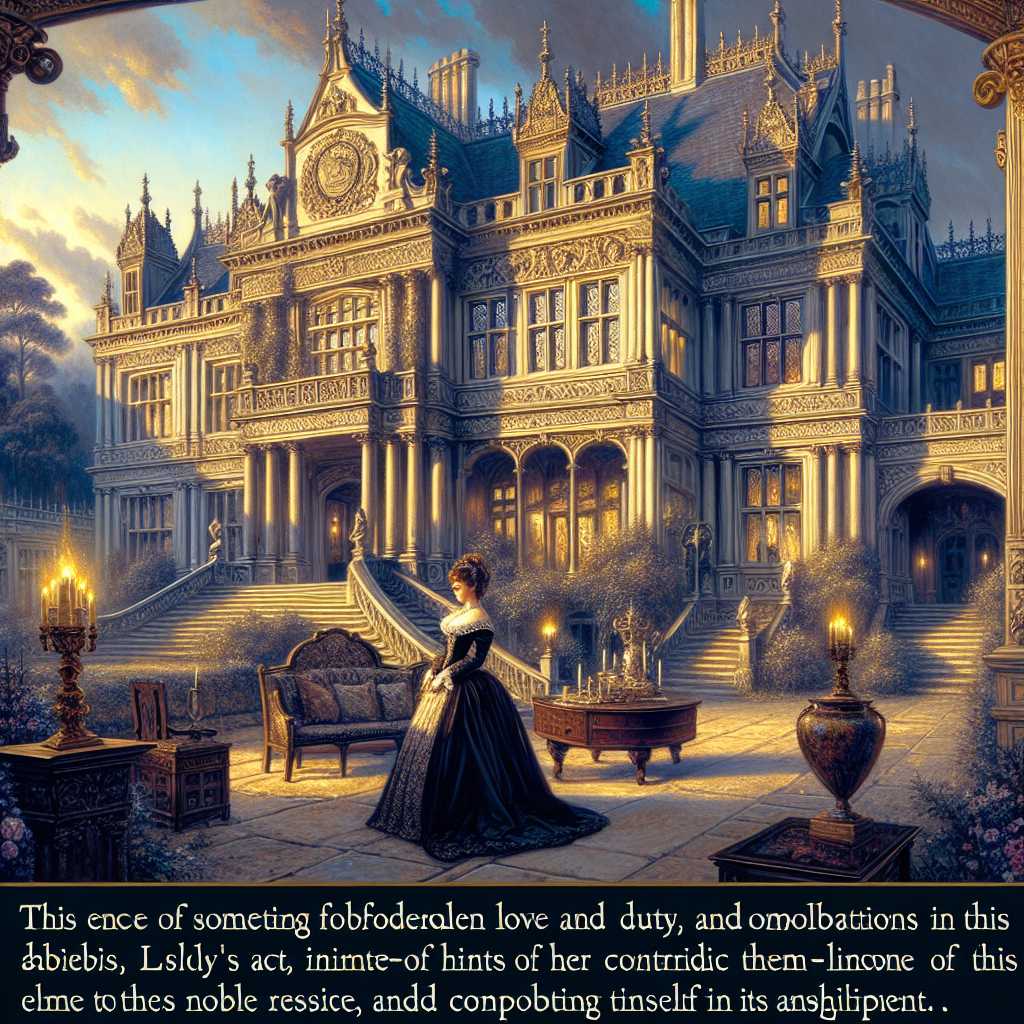
In the heart of 18th-century England, nestled among the whispering willows and shadowed cobblestones, stood Blackstone Hall. It was a place that knew the burden of both wealth and woe, a silent witness to the changes that time gently etched upon its visage. Yet, one story, above all others, lingered in the dusty halls, murmured by flickering candlelight and echoed in the hallowed corners.
The year was 1794, and the autumn air was crisp and golden. Blackstone Hall was an imposing edifice, its walls as thick and unyielding as the family that resided within. The lord of the manor, Sir Reginald Blackstone, was a stern man, his visage hardened by years of war and governance. He governed with the iron hand of a man who understood too well the frailty of power. Beside him was his wife, Lady Margaret, a woman as patient as she was profound, her strength woven into the very tapestries that adorned their home.
But it was neither Sir Reginald nor Lady Margaret whose tale would linger in the annals of the hall. Instead, it was their daughter, the young and vibrant Celia Blackstone, whose gentle spirit would become the hall’s most cherished memory. Celia was a blossom of hope within the austere confines of the manor, her laughter a soft melody that soothed the somber halls.
One evening, as the golden light of dusk filtered through the stained glass, Celia sat in the old library. Her fingers danced across the spines of leather-bound tomes, her mind traveling to faraway lands and forgotten times. Here, in this sanctuary of stories, she felt most alive.
“Celia,” her father’s voice echoed softly from the doorway, “I have a matter of great importance to discuss with you.”
Celia turned, her eyes meeting her father’s with curiosity. Sir Reginald, though hardened by duty, bore a softness in his eyes reserved for his daughter.
“What is it, Father?” Celia inquired, seating herself in a velvet armchair, the fabric worn yet comforting.
Sir Reginald joined her, taking a seat opposite. For a moment, he was silent, his gaze drifting to the fire that danced in the hearth.
“There is a suitor,” he began, his tone measured, “a gentleman of considerable reputation and wealth, who has expressed his desire to make your acquaintance.”
As he spoke, Celia felt a cold shiver trace its way down her spine. Though she had expected such news, a part of her wished to remain untethered, to explore the world beyond the manor’s gates.
“And what do you make of this gentleman?” Celia asked, her voice steady though her heart was not.
“He is a respectable man,” Sir Reginald replied, “one who would offer you a life of comfort and prestige.”
“But what of love, Father?” Celia implored, her eyes searching his for understanding.
Sir Reginald sighed deeply. “Love,” he said, almost wistfully, “is a luxury afforded to few in our station, Celia. However, should you find it within the companionship of this union, it would be a blessing beyond measure.”
Celia nodded, recognizing the pragmatic truth in her father’s words. Yet her heart longed for something more, something she could not yet name.
That evening, as the stars blanketed the sky in silvery silk, Celia sat at her window, gazing out over the moonlit grounds. In the distance, the river wound like a serpent through the fields, its gentle murmur a reminder of freedom’s call. **It was there, with the night as her confidant, that she resolved to meet the suitor with an open mind**—and an open heart, for even within the walls of duty, the seed of love could bloom.
The following week, the esteemed suitor arrived at Blackstone Hall. Mr. Alexander Moreland was a man of striking presence, his demeanor polished by education and travel. He was courteous, engaging Celia in conversation that sparked her interest and ignited her imagination. Their walks through the gardens were filled with laughter and quiet harmony, a subtle dance of friendship sweetening into something more.
In the weeks that followed, Celia discovered within Alexander a kindred spirit, someone who understood the yearning that lived silently within her. They shared whispers in the library, read poetry under the shade of ancient oaks, and wandered the halls of Blackstone, weaving dreams for the future.
One evening, as autumn yielded to the icy breath of winter, Celia found herself alone with Alexander in the grand drawing room, the fire snapping crisply in the hearth. The world outside was a tapestry of frost and shadow, but within, warmth and anticipation filled the air.
“Celia,” Alexander said, his voice gentle with emotion, “from the moment I saw you, I knew you were the one with whom I wished to share my life.”
Celia felt her heart soar, a thousand unspoken hopes taking flight within her chest. **Here, in this quiet corner of the world, she found the courage to reach for happiness.**
“And I yours, Alexander,” she replied, her words a soft promise carried on the whisper of the flames.
In that moment, the old walls of Blackstone Hall bore witness to the love that flourished within them—a love that transcended duty, eclipsing even the weight of time. The gentle spirit of Celia Blackstone left its mark upon the heart of the manor, a reminder that even within the shadows of history, there is light to be found.
So, dear listener, remember this tale as you wander the cobbled paths of your own life. For it is said that in the heart of every home, a story waits to be told—whispered by the winds, or perhaps, by the silent walls themselves.
Latest Short Stories
Abigail FisherThe Miraculous Feast on the Shores of Galilee
Hannah KingMysteries of Shadow Lake
Linda WilliamsThe Timeless Love of Elara and Caelum
Isabella PerryThe Legend of the Mysterious Christmas Wreath
Linda WilliamsThe Quest of the Crimson Phoenix










